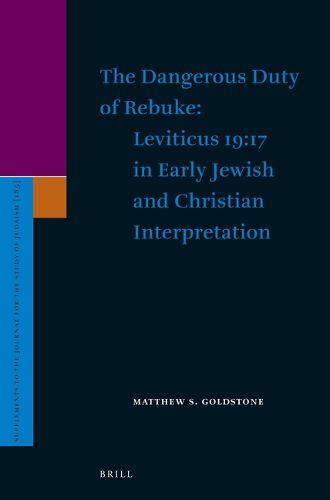Readings Newsletter
Become a Readings Member to make your shopping experience even easier.
Sign in or sign up for free!
You’re not far away from qualifying for FREE standard shipping within Australia
You’ve qualified for FREE standard shipping within Australia
The cart is loading…






In The Dangerous Duty of Rebuke Matthew Goldstone explores the ways in which religious leaders within early Jewish and Christian communities conceived of the obligation to rebuke their fellows based upon the biblical verse: Rebuke your fellow but do not incur sin (Leviticus 19:17). Analyzing texts from the Bible through the Talmud and late Midrashim as well as early Christian monastic writings, he exposes a shift from asking how to rebuke in the Second Temple and early Christian period, to whether one can rebuke in early rabbinic texts, to whether one should rebuke in later rabbinic and monastic sources. Mapping these observations onto shifting sociological concerns, this work offers a new perspective on the nature of interpersonal responsibility in antiquity.
$9.00 standard shipping within Australia
FREE standard shipping within Australia for orders over $100.00
Express & International shipping calculated at checkout
In The Dangerous Duty of Rebuke Matthew Goldstone explores the ways in which religious leaders within early Jewish and Christian communities conceived of the obligation to rebuke their fellows based upon the biblical verse: Rebuke your fellow but do not incur sin (Leviticus 19:17). Analyzing texts from the Bible through the Talmud and late Midrashim as well as early Christian monastic writings, he exposes a shift from asking how to rebuke in the Second Temple and early Christian period, to whether one can rebuke in early rabbinic texts, to whether one should rebuke in later rabbinic and monastic sources. Mapping these observations onto shifting sociological concerns, this work offers a new perspective on the nature of interpersonal responsibility in antiquity.